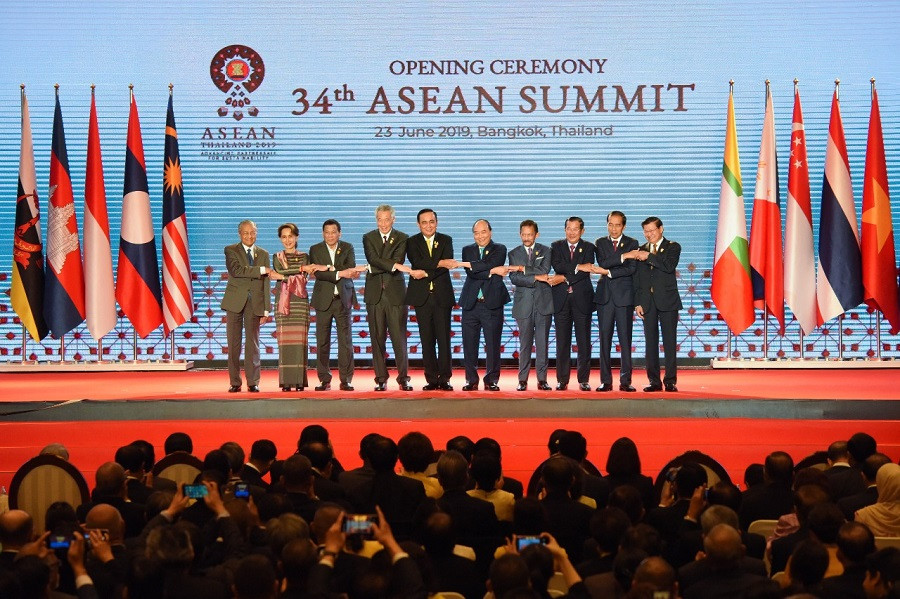Popular Reads
Top Results
Can't find what you're looking for?
View all search resultsPopular Reads
Top Results
Can't find what you're looking for?
View all search resultsPandemic concerns overshadow ASEAN meeting in Jakarta
Nearly 740 people have been killed since Myanmar's military — known as the Tatmadaw — wrestled power from the civilian government on Feb. 1.
Change text size
Gift Premium Articles
to Anyone
A
SEAN leaders are set to meet in person this weekend to address a bloody crisis that has played out in Myanmar since the military instigated a coup in February.
It will be their first face-to-face gathering since the COVID-19 pandemic started.
Though hopes for a peaceful solution in Myanmar are riding on the results of this high-level gathering, concerns over the pandemic have prompted some leaders to skip the ASEAN Summit in Jakarta altogether.
Brunei’s Sultan Hasanal Bolkiah, who leads the monarchy’s chairmanship of the regional bloc, announced the meeting last week after intensive rounds of diplomatic lobbying, following President Joko “Jokowi” Widodo’s proposal last month to hold a special summit to discuss the turmoil in Myanmar.
It would be the first time a gathering of the region’s leaders would be held at the ASEAN Secretariat in Jakarta since renovations on the building were completed in 2019.
Nearly 740 people have been killed since Myanmar's military — known as the Tatmadaw — wrestled power from the civilian government on Feb. 1. The country has gone into a tailspin since then, as opposition groups launched mass protests and many members of the public participated in civil disobedience movements against the coup leaders, posing a direct challenge to the newly established authority, the State Administrative Council.
ASEAN is currently considered to be the international community’s biggest hope for finding a solution to the political impasse, in which the Tatmadaw is clinging to power through the use of lethal force and the prodemocracy camp is demanding a full constitutional overhaul.
Facing a mounting of challenges at home, Myanmar’s coup leader, Min Aung Hlaing, will reportedly travel to Indonesia for the summit, his first overseas trip since the coup.
Most ASEAN leaders have confirmed their attendance, including Malaysian Prime Minister Muhyiddin Yassin and Vietnamese Prime Minister Pham Minh Chinh, both of whom will attend an in-person summit for the first time since coming to power in their respective countries.
However, Thailand’s Prime Minister Prayut Chan-o-cha said he would skip the meeting, even after President Jokowi called him on Thursday morning in a bid to persuade the former army general to come.
Prayut, who is close to Myanmar’s senior generals and who himself was a former coup leader, cited the dire coronavirus situation in his country as the reason he could not attend the summit.
Thailand has been reporting more than 1,500 new daily COVID-19 cases in the last seven days, a sharp increase from 58 cases on average at the beginning of this month. This has prompted its government to call a ban on some activities and the closure of certain venues to limit people’s movements and reduce the risk of transmission.
Thai Foreign Ministry spokesman Tanee Sangrat confirmed that the PM would send top diplomat Don Pramudwinai in his place, AFP reports.
Singaporean Prime Minister Lee Hsien Loong has confirmed his attendance, according to the Foreign Ministry, but Philippine President Rodrigo Duterte has opted out of the summit due to the requirement to be physically present, his spokesman Harry Roque has said.
The absence of the Thai PM, in particular, is a blow to ASEAN’s efforts, said Randy Nandyatama, a senior fellow at Gadjah Mada University’s ASEAN Studies Center, adding that it would make the summit more difficult to run.
“We know that Singapore and Thailand have more leverage through investments and personal relations. The absence of the prime minister of Thailand shows that there is no agreement [within ASEAN] on the principles and objectives of this summit,” he told The Jakarta Post on Thursday.
The need to physically meet has been a cornerstone of ASEAN’s diplomacy, with officials at all levels preferring candid and informal engagements to broach issues of shared concern. But with the pandemic shifting most of the legwork online, health and safety considerations began trumping the need for in-person engagement, experts say, even as many diplomats yearned for a return to normalcy.
While Indonesia still imposes travel restrictions on foreigners, state health regulations allow exceptions for high-level visits. In past months, the country has hosted senior officials from Iran, the United Kingdom, Singapore, Malaysia and Hungary.
Lidya Christin Sinaga, a researcher at the Indonesian Institute of Sciences (LIPI), said, however, that COVID-19 concerns surrounding the meeting were perfectly understandable, as the region was still not out of the woods yet in terms of controlling the outbreak.
While the number of active cases in Indonesia has slowly dipped below the 100,000 mark, it rose again slightly on Thursday with 6,243 new COVID-19 infections.
Authorities have cautioned against another wave of transmission as people look to travel to their hometowns for Idul Fitri.
“However, there is still significant urgency for ASEAN to have the face-to-face meeting,” Lidya said, noting how virtual meetings have so far resulted in deadlocks among member states.










